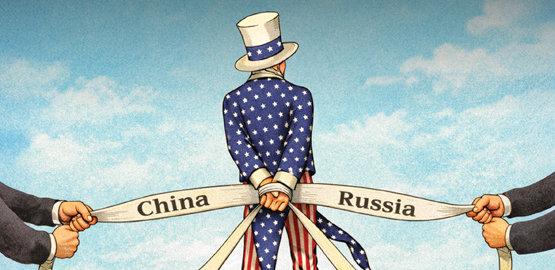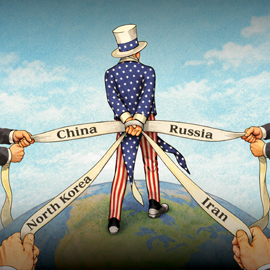News
What the Use of Russian Conscripts Tells Us About the War in Ukraine
Russian President Vladimir Putin likely never thought he would have to admit that conscripts had been used in Ukraine — and, yet, the Russian government had to do just that.
Conscription is a sensitive topic in Russia, and their use by the Kremlin indicates the degree to which the country’s leaders believed they could keep the cost of the war hidden from the domestic populace. But now that their deployment is public, what does Russia’s continued use of conscripts say about the war and the future course the conflict may take?
Shield of the Republic: Heeding the Lessons of the Cold War (with Hal Brands and Bill Kristol)
Mystery guest host (Bill Kristol) joins Eric for a discussion with Johns Hopkins SAIS Professor Hal Brands about his new book the Twilight Struggle. They discuss the lessons of America's cold war strategic competition with the USSR for today's era of strategic competition with China and Russia—the role of strategy, economic competition, political warfare, and more.
China’s Ambitions for AI-Driven Future Warfare
The Chinese Communist Party (CCP) sees advanced technology as one of the keys to victory in its challenge to global order in this century. CCP General Secretary Xi Jinping has pronounced that the world is on the precipice of a “fourth industrial revolution” centered upon artificial intelligence and autonomous technology. China is mobilizing every sector of society to contribute to the state’s grand technological ambitions in its long-term struggle against the United States.
Nowhere is this clearer than in the realm of military affairs. China’s People’s Liberation Army (PLA) is racing to integrate futuristic technologies into its historically less-advanced military. The PLA has coalesced around a new organizing concept for how it thinks that advanced technologies will affect warfare in this century. “Intelligentization” represents China’s vision for a new revolution in military affairs. This little-known new concept is driving the PLA’s modernization efforts and signals the expansive ambitions the People’s Republic of China (PRC) has in challenging American military dominance globally.
Schrodinger’s Military? Challenges for China’s Military Modernization Ambitions
Xi Jinping wants China to have a “world-class military” by the middle of the century. While the country has undergone a historic military modernization effort in the last two decades, the People’s Liberation Army (PLA) remains a regional military power, albeit one with growing ambitions to achieve regional dominance and expand its ability to project power around the globe.
Is Xi’s dream of a world-class PLA realistic? His vision largely depends on PLA efforts to increase jointness and achieve intelligentization.
By all accounts, the Chinese military is on the march. The PLA’s annual budget grows at a rapid pace year after year. The PLA Navy is now larger than the U.S. Navy. “Carrier-killer” missiles attempt to threaten America’s ability to project power in the Indo-Pacific. The PLA’s increasingly sophisticated nuclear arsenal grows at an alarming pace. But these raw numbers alone do not capture some of the more subtle measures of warfighting capabilities, such as organization, training, education, and doctrinal concepts. These seldom noted yet critical measures of military power may tell a different story about the PLA’s pace of growth and ability to achieve its ambitions.
How Chinese Strategists Think AI Will Power a Military Leap Ahead
The People’s Liberation Army has yet to adopt a definition, let alone a formal plan, for “intelligentization (智能化),” a Chinese vision for the transformation of warfare through artificial intelligence and automation. But Chinese military theorists see it as a rare opportunity for “leapfrog development” over adversaries. One author suggests that Star Wars will “become a reality”; another says the fantasies from “mythological fiction” will come true. Their writings, while not authoritative, have coalesced around several key themes that offer a crucial glimpse into potential PLA thinking and ambitions.
Negotiating from Strength: Washington, Beijing and Climate Change
There is growing pressure for the Biden administration to de-escalate tensions with China for the sake of climate cooperation. In a letter published on July 8, climate organizations called on the United States to work on “environmental, human rights, social, and governance standards” with China to avert a new Cold War.
Enticing China to act in support of the Biden administration’s effort to reduce global carbon dioxide emissions will not succeed. China’s significance as the world’s greatest emitter of pollution and Chinese policymakers’ own view of climate change negotiations will render any cooperative strategy ineffective. As our primary strategic rival, China will likely only respond to pressure on climate.

























